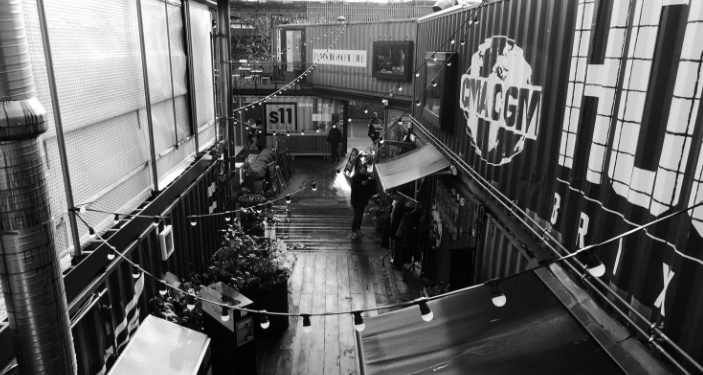Live in a container with river views, work in repurposed auction rooms, go out for dinner in a car park – over the last ten years, London has seen growing numbers of pop ups, container cities and community gardens take over vacant spaces, for a summer or a few years. These spaces are often referred to as “meanwhile”, because they are interim solutions: landowners decide to open up a space instead of hoarding it, while they draw up plans for the site or wait for planning approval.
Meanwhile spaces seem to be thriving in London, but not because they are highly profitable. Most of the time, landowners receive little or no rent at all, because occupiers are only able to recoup their investment over a fairly short, often unknown period. Instead, retail experts speak of deep changes in consumer demand, which drive retail and creative businesses to work with changing and unusual spaces. Urbanists see an appetite for more organic, less financialised pieces of a city that give another life to buildings and materials, thanks to communities’ time and resources.
There are also well-known economic factors behind the rise of meanwhile activity. The costs of living and operating a business in London are dizzyingly high – so for those looking to experiment on the cheap or who are able to move at short notice, meanwhile spaces are often the most affordable option in many parts of London.
Yet, despite the pressing demand for affordable space, we know very little about the supply of meanwhile space. From desk research and wandering around the city, one can identify about 60 meanwhile spaces active or imminently about to open in London – pop ups, shared workspaces or community gardens – that together represent roughly the equivalent of a Westfield shopping centre in terms of space.
But what we’ve found is just the tip of the iceberg. Most meanwhile spaces don’t feature food trucks, containers or painted murals. There is a lot going on inside buildings, especially spaces made available for housing or offices, and these are often not in the public realm.
The bulk of London’s meanwhile spaces fill the city’s principal need – housing. Earlier this year, a report produced for the London Assembly found that nearly 7,000 people live in meanwhile spaces in London. These are mostly property guardians, but there is also an increasing number of temporary housing schemes for homeless people. This may be short of the 30,000 people who used to squat in vacant buildings in 1970s London – but still, the rapid rise of property guardianship in the capital has surprised many. London’s heated private rental sector probably explains most of it, but property guardianship also has an advantageous tax regime: putting live-in guardians into a vacant commercial building slashes its property tax bill by nearly 100 per cent.
Even amongst commercial uses, the largest meanwhile projects often go unnoticed. Most have actually become interim by default, as landowners announce plans to redevelop existing buildings. Croydon may have successfully attracted Boxpark, with its meanwhile retailers and high profile event space, but the majority of Croydon’s meanwhile uses are 1960s commercial buildings waiting for redevelopment. Similarly, Elephant and Castle’s shopping centre now provides a lot of affordable space on a meanwhile basis, though the opportunity is not branded as such.
Given the amount of development taking place in London, meanwhile uses could play a much greater role in the city’s economy, and in addressing the affordability challenge. This is the subject of a forthcoming Centre for London report, which looks at why and how we should scale up London’s meanwhile economy. As long as London is short of space – for experimentation, start-ups and community initiatives – meanwhile use won’t be a passing trend.
Nicolas Bosetti is Research Manager at Centre for London, for whom this article was originally written. Many thanks for their permission to re-publish it. Follow Nicolas on Twitter.
***
LONDON AND BREXIT DEBATE: Will leaving the EU be good or bad for the capital? On London and the illustrious London Society have jointly organised a debate about this crucial question. Anti-Brexit campaigner Andrew Adonis, former Boris Johnson adviser Daniel Moylan, Lib Dem AM Caroline Pidgeon and Victoria Hewson from the Institute of Economic Affairs form an all-star line-up of speakers. Buy your tickets here.
